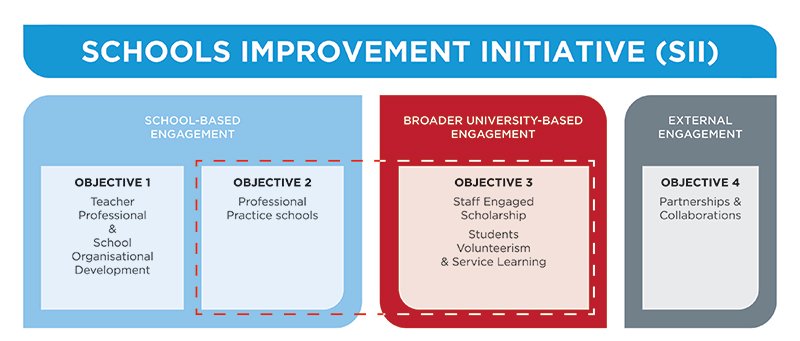
OBJECTIVE 1: Teacher professional and school organisational development
The main delivery vehicle for teacher professional and school organisational development is the range of university-certified professional development courses [1] administered and delivered by the Schools Development Unit (SDU) in the university’s School of Education. This preferred professional and organisational development model links formal qualifications with school-based support thereby enabling university staff to address issues of course and curriculum implementation in the classroom.
OBJECTIVE 2: Professional Practice Schools (PPS)
To date, six primary and two secondary schools in Khayelitsha have been identified as SII Partner Schools. These are sites where more extensive reciprocal links with the university are established. Through the School of Education, opportunities are created for UCT post-graduate student teachers[2] to undertake their teaching practice in these schools. As part of this initiative, piloted in 2013, the university also encourages its graduates to apply for teaching posts in these (and other) Khayelitsha schools as they become available. This strategic objective supports the notion of collaboration between universities and schools as a recognised approach for improving teacher and student learning practices (Deppeler, 2006; Cohen and Hill, 2000; Ramsey, 2000). In addition to pre-service teacher training, the PPS model enables fourth-year Occuptional Therapy (OT) students from the Faculty of Health Sciences (FHS) to undertake the practical component of their qualification in the partner schools. From 2014, the seven-week rotational blocks of these FHS students has been extended to include Speech Therapy and Audiology students as well as Physiotherapy students. As from 2021 the collaboration with FHS will include 4th year MBChB students undertaking their “Health in Community” block.
OBJECTIVE 3: Broader Institutional Engagement
As a direct link to Objective 2, the SII sees itself as a conduit which facilitates a greater level of engagement by university-based social responsiveness initiatives and programmes in Khayelitsha schools. Significant also in terms of broader university engagements is the collaboration between the SII and UCT’s student volunteer organisations. The student volunteer programmes, ‘TeachOut’ and ‘Inkanyezi’, for example are UCT-based interventions offered by Ubunye student volunteers to Grade 8 and 9 learners in one of the partner secondary schools. A second project, initiated and coordinated by the MBChB students is ‘Siyafunda’: Grade 12 learners from our two partner secondary schools receive support in Mathematics and Physical Sciences. As from 2020, due to COVID-19, this intervention has taken place via WhatsApp engagement.
OBJECTIVE 4: Partnerships and Collaboration
In deepening its engagement in schools, the SII works in partnership with education-based groupings outside of the university. This includes significantly, collaboration with Metropole East Education District (MEED). Another key focus of partnership and collaboration is learner wellness. Through the SII’s School Wellness Centre, we work closely with a number of NGOs in Khayelitsha to extend our pool of expertise and resources to our 9000+ learners in the eight partner schools. The SII works in partnership with The Bookery, Rotary, Nal’ibali, the Otto Foundation and Metro East Education Department to ensure the ongoing effectiveness of the Library Project. To date five of the eight partner schools have functional libraries with full time Library Assistants, employed by the schools.
OBJECTIVE 5: Psychosocial Support
A key focus of the SII is psychosocial support through the Schools Wellness Center which is now operational in all eight partner schools. Our qualified social worker coordinates the Centre, and together with her sixteen third- and fourth-year social work students, offers psychosocial support to the learners. Support is also given to the teachers, for example through a six-hour university approved, SACE accredited short course: Psychological First Aid for Educators in Times of Crisis.
[1] Besides a number of accredited two-year part-ttime Advanced Certificates in Teaching (ACT), a suite of certified Short Courses is also offered. These formal qualifications are variously tailored to meet either the subject-specific professional development needs of practising teachers and/or the broader organisational management needs of school leaders. I
[2]The university’s pre-service teacher training is limited to graduates only.
